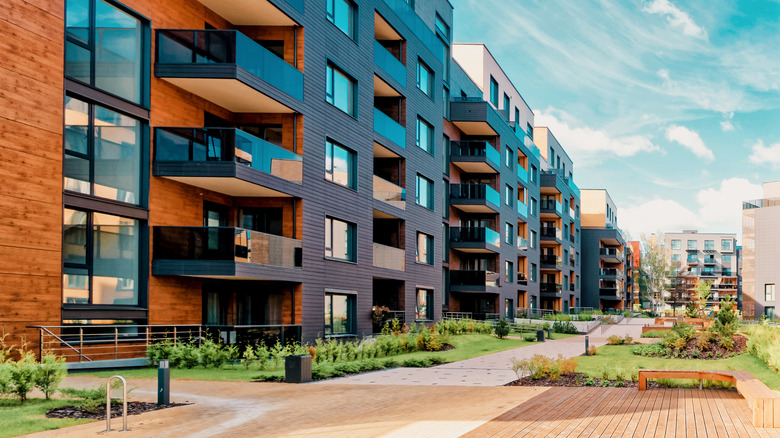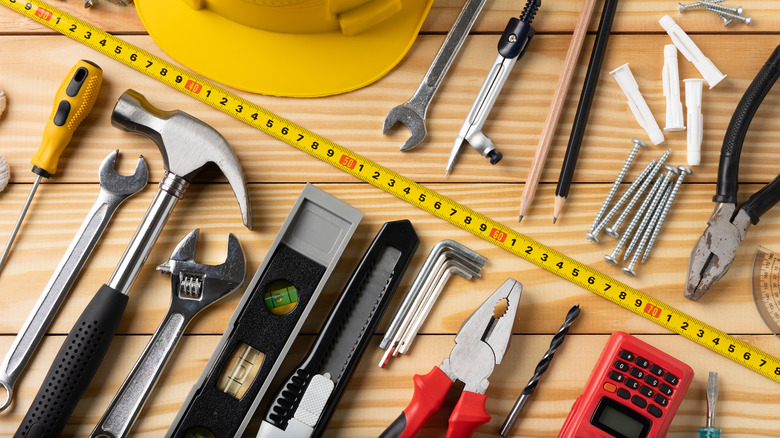Condo Vs. Apartment: What's The Difference?
More often than not, the terms condo and apartment are used interchangeably. Between matching layouts, neighbors, and shared space, it's clear these two places of residence have a lot of general factors in common. Due to these similarities, among many more, it's not surprising many people confuse the two. However, if you take a look deeper, there are many key distinctions.
Ownership, pricing, and personal touch are some of the most significant differences that separate condos and apartments from each other. These are likely going to be the key variants that can make one decide which one of the two they would prefer to call home. However, there are still many other factors to take into consideration when deciding which housing option is best for you. According to Bankrate, condos are best for those needing something more affordable and those looking to be a homeowner. In opposition, apartments are best for those who don't want the expenses or responsibilities that come with ownership. Furthermore, apartments are great for those that need a temporary place to live for a short amount of time, such as those for school or work requirements.
The Difference: who owns what?
Perhaps the biggest and most significant key difference between apartments and condos is who owns each of them. According to Apartments.com, condos are owned, managed, and run by a landlord, which means they are private residences that these owners rent out. Usually, it's located in a community or residential area; however, the unit itself is owned privately. The owner of this condo has a full say in who lives there and what is and isn't allowed, which is far more personal than renting an apartment. Additionally, condo landlords don't usually hang around, giving the renter tons of privacy.
As for apartments, ownership regulations are the complete opposite of condos. Apartments are typically owned and managed by a corporation. These corporations are known as property management companies. Apartments tend to have a wide variety of locations, such as residential buildings, complexes, community areas, etc., and the same person runs all the apartments in such a building. They typically all have the same layout, and all tenants follow the same guidelines. Usually, the owner resides onsite and can be found in the leasing or main office of the building or community.
Rent pricing for each varies
The first important financial factor to know is that condos and apartments come with their own fees. These fees also tend to differ from each other. With condos, the owner will decide how much and how often you pay rent, Maximum Exposure Real Estate notes. This is almost always decided and set out when signing the lease. Additionally, the rent you pay for your condo will usually differ from the amount of rent others pay. Sometimes, utilities are included with rent, meaning you'll pay one flat rate for both rent and utility bills each month.
For apartments, all renters are required to sign a lease. Typically, these leases last for a year at a time, but some apartments may offer short-term leases depending on other factors. Some apartments may even offer month-to-month leases as well, but usually, they offer a variety of lease contracts the tenants can choose from. Typically, the rent stays the same throughout the lease, although it can be increased with given notice. The rent is typically decided on market conditions, the tenant's income, and the availability of units. Normally, utilities are not included in the rent for this residence type.
Maintenance responsibility is different
No matter your choice in the home, you will run into maintenance needs. This is just a natural and extremely unfortunate part of life. Furthermore, just like with ownership and rent, the responsibility of these needs differs between a condo and an apartment. According to Apartments.com, the landlord is usually responsible for the home's maintenance needs in a condo. Sometimes, the owner will have their own services they use to fix the issues that may arise. However, on some occasions, you as the tenant may be responsible, but this is something to discuss with the landlord upon signing the lease.
As for apartments, you will almost never be responsible for any repairs that may arise. Many apartment corporations offer free and timely maintenance. Furthermore, a lot of maintenance is 24 hours a day and seven days a week. Most apartment corporations have a number you can call to put in a request to get the issue fixed. The number of issues prior to yours will depend on how long it will take for yours to be resolved. Usually, there is a business day number and an after-hours number.



